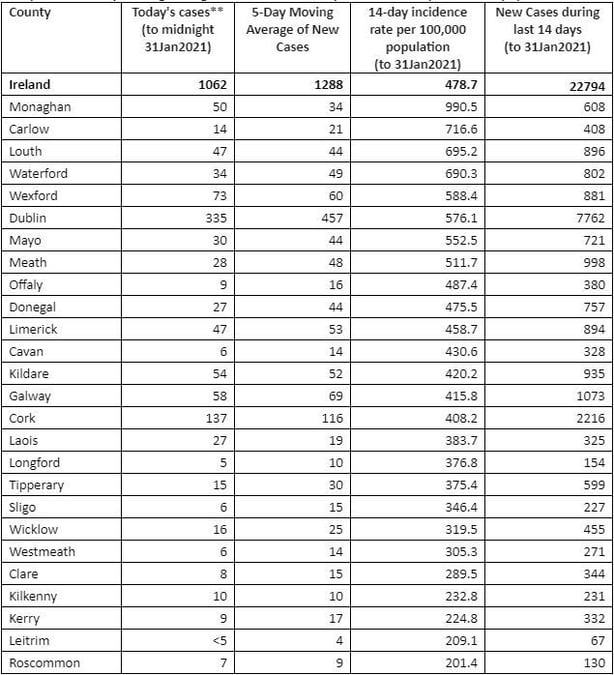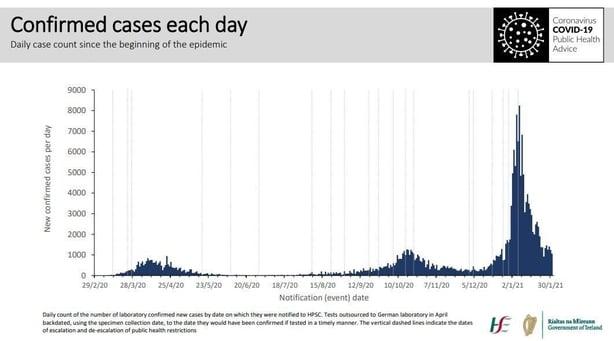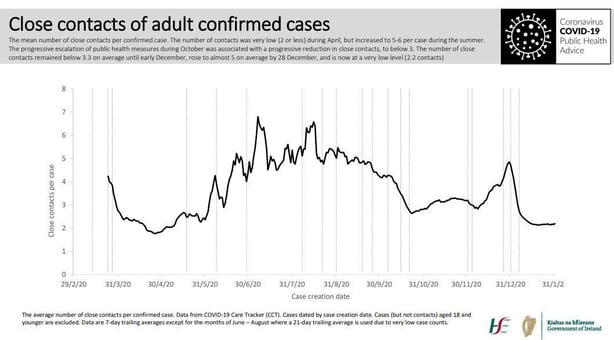The Chief Medical Officer has said that while there has been much improvement in relation to the incidence rate of Covid-19, he is concerned that progress is slowing down.
Dr Tony Holohan appealed for people to take care in any setting where they come in contact with others, especially workplaces and retail settings.
It comes as the Department of Health was notified of ten further coronavirus-related deaths and 1,062 confirmed cases.
The number of people who have died with Covid-19 is now 3,317, while the total number of confirmed cases now stands at 197,553.
There are 1,436 Covid-19 patients in hospital, with 207 in intensive care, which is down four from yesterday.
Dr Holohan said: "While we have experienced very significant improvement in incidence over recent weeks, I am concerned that it appears to be slowing down at much too high a level of infection.
"People need to take real care in any setting in which they come into contact with others.
"In particular, workplaces and retail settings need to review their existing protocols and ensure that their staff and customers are protected as much as possible.
"Given the prevalence of the B117 variant and how infectious it is, it is extremely important that people take all preventative measures possible, including staying home."
The Chair of NPHET's Irish Epidemiological Modelling Advisory Group said that part of the plateauing of case numbers now is that more close contacts are being tested, which would push case numbers up.
However, Prof Philip Nolan said that what concerns him is that it does not look as if this is the full explanation for the plateauing of case numbers.
He said NPHET thinks they are seeing "a genuine increase in viral transmission due to ... an entirely understandable tendency that we have to simply forget the basic measures around distancing and hand hygiene".
The five-day moving average of Covid-19 cases in Ireland is 1,288 cases per day, Deputy CMO Dr @ronan_glynn reports as he sets out the latest #Covid19 figures | https://t.co/jMUdGYe1Mz pic.twitter.com/JrReWeyZI3
— RTÉ News (@rtenews) February 1, 2021
Speaking at a Department of Health briefing, Prof Nolan said that after a very rapid decline day-on-day, week-on-week, over the last seven or eight days case numbers have been relatively constant at around 1,300 cases a day.
He said the seven-day cumulative incidence, which is the best indicator of the level of active infection in the population, has also just started to plateau.
Of the new cases confirmed today, 335 are in Dublin, 137 in Cork, 73 in Wexford, 58 in Galway, 54 in Kildare and the remaining 405 cases are spread across all other counties.
In a statement, the National Public Health Emergency Team said that the 14-day incidence of the virus per 100,000 now stands at 478.78.
The counties with the highest rate of infection are Monaghan (990.5), Carlow (716.6) and Louth (695.2).
The counties with the lowest rate of incidence are Roscommon (201.4), Leitrim (209.1) and Kerry (224.8).

We need your consent to load this rte-player contentWe use rte-player to manage extra content that can set cookies on your device and collect data about your activity. Please review their details and accept them to load the content.Manage Preferences
Prof Nolan told the briefing that demand for testing is high and test positivity had been decreasing very rapidly and has stabilised over the last couple of days.
He said the level of new cases per day has been relatively constant over the last week, and that is across all age bands up to 65 years of age.
Prof Nolan said case numbers have been very high in age 65 and older and although case numbers are continuing to decline in this age group and in the over 85s, they are high in that age group.
He said those over the age of 85 and older continue to be the highest incidence group in the population, with an incidence almost three times as high as a population as a whole.

Deputy Chief Medical Officer Dr Ronan Glynn said last week there were 29 outbreaks of Covid-19 in workplaces, including construction, manufacturing, meat processing and food production.
However, he told the briefing that workplaces are coming through consistently as an area where people are saying they may be letting their guard drop a bit.
Dr Glynn said in relation to the information they are getting from public health doctors "this is only the tip of the iceberg".
"The reality is given the volume of cases and the pressure they're under in terms of tracing, a lot of what they're reporting is based on individual case interviews," he said.
Dr Glynn said that what is coming through is that people are acquiring this in their workplaces.
He said because the variant first identified in the UK is more transmissible, every time we drop our guard, it is likely to have greater consequences that a couple of months ago.
Dr Glynn said: "Now is not the time to be going into a workplace, unless you really have to."
'People are acquiring this in their workplaces' Deputy CMO Dr @ronan_glynn says of #Covid19 transmission trends, adding 'Now is not the time to be going into your workplace unless you really have to' | https://t.co/jMUdGYe1Mz pic.twitter.com/eAOjVi6utr
— RTÉ News (@rtenews) February 1, 2021
In relation to close contacts, Prof Nolan said that the figure is at just over 2.
Last October, this figure was at 2.5, but as soon as it went down to 2 it began to drift up again.
Prof Nolan said that looking at data from last week, there was no sign of the number of close contacts rising.
Dr Holohan said he did not think that this would be a summer when millions of people can expect to be heading off to beaches abroad.
He said it was not realistic and all non-essential travel should be avoided for the foreseeable future.
'I don't think we're headed for a summer where millions of people from this part of the world, from Europe, can expect to be heading to beaches that are other than in their own localities', @CMOIreland says | #Covid19 | https://t.co/q5vLHHJ71e pic.twitter.com/x0wUzXR3m7
— RTÉ News (@rtenews) February 1, 2021
Dr Glynn said that people have been at home for nearly a month, and there has been "a really, really dramatic improvement over that month", so people's efforts have made a real and significant and substantial difference and many lives have been saved as a consequence of people's efforts.
He told the briefing that there is still a very high level of disease in the country and we need people to stick with this.
Dr Holohan said the NPHET strategy was not dramatically different to what is proposed by campaigners for a Zero Covid island.
He said case numbers can be brought down to low levels as this had been done before.

Prof Nolan said more can be done to minimise imported cases. But overall, he said, lives are going to get better, but not return to normal for a considerable time, until there is significant vaccination of the population.
Dr Siobhán Ní Bhriain, Consultant Psychiatrist and HSE Integrated Care Lead, said they were seeing a lot more people with sinusitis being diagnosed with Covid-19, often in the absence of a temperature.
Speaking at the briefing, she said GPs threshold for referring for a Covid test is "anything respiratory" or a temperature and cough.
'A lot of sinusitis does seem to be Covid', Dr Siobháin Ní Bhriain tells the #NPHET briefing on #Covid19 | https://t.co/q5vLHHJ71e pic.twitter.com/RBMC2H0kAu
— RTÉ News (@rtenews) February 1, 2021
Elsewhere, gardaí said more than 2,100 fines have been issued at checkpoints for breaches of the travel restrictions.
Latest Health Service Executive Covid-19 vaccination figures show that 150,500 first doses have been administered up to the end of last month.
In relation to second doses, 49,300 have also been administered. It gives a total of 199,800 doses administered.
The National Immunisation Advisory Committee (NIAC) has recommended that the AstraZeneca vaccine can be an option for people over 65 years of age.

